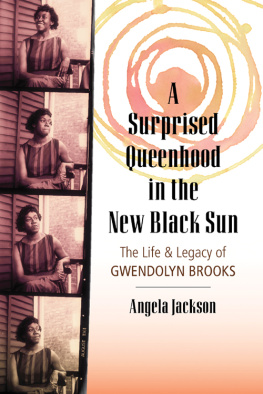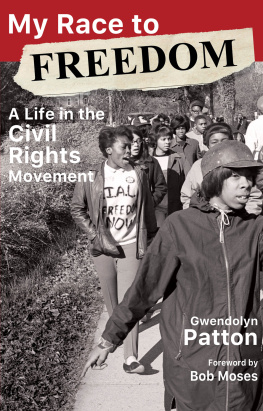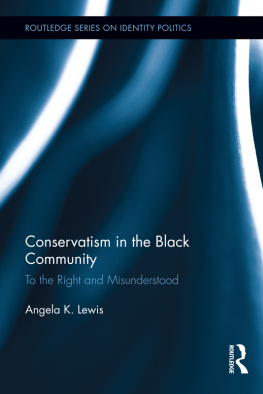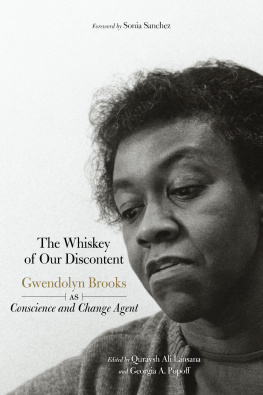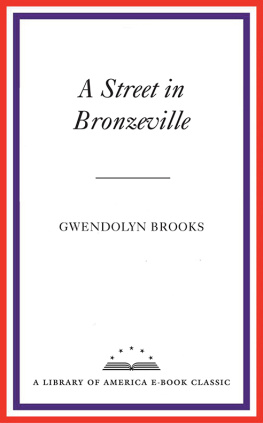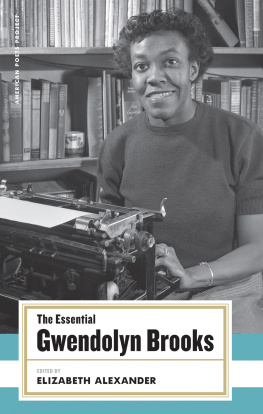Angela Jackson - A Surprised Queenhood in the New Black Sun: The Life & Legacy of Gwendolyn Brooks
Here you can read online Angela Jackson - A Surprised Queenhood in the New Black Sun: The Life & Legacy of Gwendolyn Brooks full text of the book (entire story) in english for free. Download pdf and epub, get meaning, cover and reviews about this ebook. year: 2017, publisher: Beacon Press, genre: Non-fiction. Description of the work, (preface) as well as reviews are available. Best literature library LitArk.com created for fans of good reading and offers a wide selection of genres:
Romance novel
Science fiction
Adventure
Detective
Science
History
Home and family
Prose
Art
Politics
Computer
Non-fiction
Religion
Business
Children
Humor
Choose a favorite category and find really read worthwhile books. Enjoy immersion in the world of imagination, feel the emotions of the characters or learn something new for yourself, make an fascinating discovery.
- Book:A Surprised Queenhood in the New Black Sun: The Life & Legacy of Gwendolyn Brooks
- Author:
- Publisher:Beacon Press
- Genre:
- Year:2017
- Rating:5 / 5
- Favourites:Add to favourites
- Your mark:
- 100
- 1
- 2
- 3
- 4
- 5
A Surprised Queenhood in the New Black Sun: The Life & Legacy of Gwendolyn Brooks: summary, description and annotation
We offer to read an annotation, description, summary or preface (depends on what the author of the book "A Surprised Queenhood in the New Black Sun: The Life & Legacy of Gwendolyn Brooks" wrote himself). If you haven't found the necessary information about the book — write in the comments, we will try to find it.
Angela Jackson: author's other books
Who wrote A Surprised Queenhood in the New Black Sun: The Life & Legacy of Gwendolyn Brooks? Find out the surname, the name of the author of the book and a list of all author's works by series.
A Surprised Queenhood in the New Black Sun: The Life & Legacy of Gwendolyn Brooks — read online for free the complete book (whole text) full work
Below is the text of the book, divided by pages. System saving the place of the last page read, allows you to conveniently read the book "A Surprised Queenhood in the New Black Sun: The Life & Legacy of Gwendolyn Brooks" online for free, without having to search again every time where you left off. Put a bookmark, and you can go to the page where you finished reading at any time.
Font size:
Interval:
Bookmark:

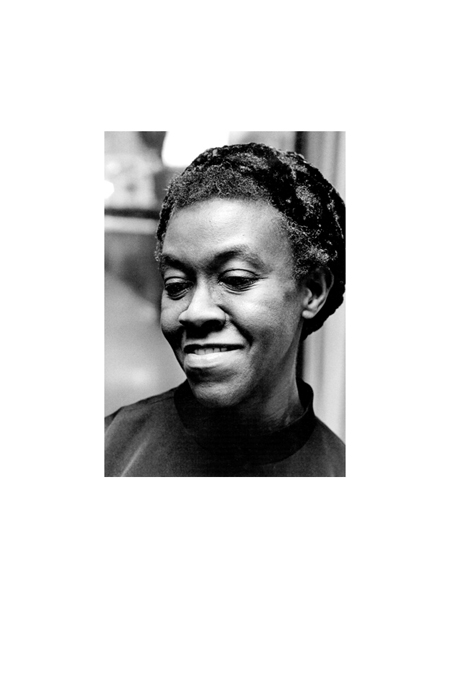
OTHER BOOKS BY ANGELA JACKSON
POETRY
It Seems Like a Mighty Long Time: Poems
And All These Roads Be Luminous
Dark Legs and Silk Kisses: The Beatitudes of the Spinners
FICTION
Roads, Where There Are No Roads: A Novel
Where I Must Go: A Novel

I am moving. I am not still. I am ready to be ready.
GWENDOLYN BROOKS
from The Near-Johannesburg Boy
CHAPTER ONE

I t was an indelible announcement written in black and white for all to see. The first nationally published poem of Gwendolyn Brookss appeared in American Childhood, in October 1930, when she was only thirteen years old. Earlier, at eleven, shed published four poems in a local neighborhood paper, the Hyde Parker, foreshadowing her brilliance. It was a brilliance that would shine through decades and across nations, bedazzling and impacting hundreds of poets and millions of audiences, in all walks of life.
Gwendolyn was a black teenager living on a quiet street in Chicagos Bronzeville neighborhood at 4332 South Champlain Avenue, where her family had lived since she was four years old.
Bronzeville, the name coined by an editor of a black newspaper, the Chicago Bee, was named for the color of the areas inhabitants. In those days, Bronzeville proper stretched from Thirty-First to Thirty-Ninth, and from State Street to Cottage Grove. It was a jewel of colored masses in a segregated space. The people were too often poor and illiterate, but they were also industrious and dignified, creative in music, language, dance, and style. They were the salt of the earth and birds who managed to fly with cramped wings. Gwendolyn, ever observant, settled in to learn the ways of her people, the geography and genius of Afro-America.
Hers was a protected space guarded by father and mother. She and her brother, Raymond, were nurtured and shielded by their father, David Brooks, a janitor at McKinley Music Company, and by their mother, Keziah Wims Brooks, a former schoolteacher who had given up working in the classroom to guide her own children. Gwendolyn was loved.
It was 1930 when she made her national debut. The world was just entering the Great Depression. But Gwendolyn didnt feel depressed. She was buoyed by dark ink on the pages of Writers Digest, which she discovered at age thirteen. She reveled in the company of other writing souls who were on the same quest as sheto have their expressions published. She learned to send her work out, to include a self-addressed stamped envelope so that it might be returned when it was rejected. For rejection would and did come. She sent poems and stories out. She got them back. Her desk was her headquarters. But one day the letter she had been waiting for, a letter of acceptance, did come. At that moment, she was deliciously light-headed and light-hearted. Her first poem, Eventide, was published in a national magazine. No doubt, her family celebrated her. She basked in her first victory, her announcement to the world.
When the sun sinks behind the mountains,
And the sky is besprinkled with color,
And the neighboring brook is peacefully still,
With a gentle, silent ripple now and then;
When the flowers send forth sweet odors,
And the grass is commonly green,
When the air is tranquilly sweet,
And children flock to their mothers sides,
Then worry flees and comfort presides
For all know it is welcoming evening.
Of course, there were no mountains in Chicagoexcept for the mountains of clouds in the sky a young Gwendolyn was fond of studying. And no brook ran down Champlain Avenue. But Gwendolyn had learned, in her extended reading, about these natural wonders, and her imagination soaked up the solace of natures beauty. Her experience in the Brooks household provided the template for the comforts of a welcoming home.
She was a pretty girl in her darksome way. And she was in love. She was always in love. Words and books were the love of her young life. Who would have thought that a baby girl born to David and Keziah Brooks in the dining room of her grandparents two-story, single-family home at 1311 North Kansas Avenue in Topeka, Kansas, on June 7, 1917, would so soon become a published poet? Her parents, having migrated to Chicago earlier, had returned to Topeka for her birth. Gwendolyn was born during the Great War across the ocean, but she must have felt the reverberations of a world in conflict as she grew up. Negro soldiers were deemed unfit to fight by US commanders, so they battled under a French flag and returned home as heroes. She would become used to the theme of war. She was in touch with it, even in her little corner of the world.
Gwendolyn wrote poems a long time before she was published. She would sit on the top of the back steps and dream in poetry about the magic of sky and the mysteries of her future. She wrote a poem a day from the time she was eleven. Sometimes two or three. She was devoted to her poetry because her mother believed in her ability, her gift for it. When she was seven, she showed her mother her page of rhymes. Her mother was overjoyed, excited at the possibility of a poetic daughter who would conquer the segregated world with elegant and eloquent language. She, a schoolteacher, knew how important it was to achieve in letters.
Youre going to be the lady Paul Laurence Dunbar! Keziah Wims Brooks exclaimed. And Gwendolyn believed this because her mother had said it was so. Her mother would do all that she could to make it happen. For example, early on Gwendolyn did not have to do chores. Then later she dusted, swept, did some laundry, and washed dishes. But her mother carried the work of the household. Her mother sang Brighten the Corner Where You Are as she went about her work for her gifted child. Gwendolyn, with pen in hand, brightened her own corner in her little room of her own.
When she was in her early teens, her father gave her a desk of her own that he got from McKinleys. It was a desk full of compartments where she kept notebooks that shed been writing in since she was eleven and special books like the Emily books, L. M. Montgomerys books about a Canadian girl who, like Gwendolyn, wanted to be a writer. Of course, she kept The Complete Paul Laurence Dunbar.
When Gwendolyn wasnt writing, she was reading. Even at Christmas, she read. She sat near the Christmas tree and re-read the same book on that holy day: The Cherry Orchard, by Marie Battelle Schilling, a gift from Kayola Moore, her Sunday school teacher at Carter Temple Colored Methodist Episcopal Church. Gwendolyn would sit amid tinsel and gold, under a star-topped tree, and lose herself in the same book each year. Or did she find herself in the same book? Did she find herself in any story or poema vibrant, vivid, adventuresome self who taught her to live more confidently, at least in her mind? She only had a few friends on her short block.
She was a dark-skinned girl at the time when being a decidedly dark girl was not the most desirable thing to be. Black people, worldly-wise, sang, If youre white / Youre all right. If youre yellow / Youre mellow. If youre brown / Stick around. If youre black / Get back. Get back. Get back. Gwendolyn understood the color code. She was bright that way. At the time her first poem was chosen for publication, she was not the most popular girl in any part of Negro society. But her self-esteem did not depend on others choosing her. She chose herself. Rejection hurt, but she had early on fallen in love with her own color because her parents, by their love of her and her brother, had taught her to love the totality of herself.
Font size:
Interval:
Bookmark:
Similar books «A Surprised Queenhood in the New Black Sun: The Life & Legacy of Gwendolyn Brooks»
Look at similar books to A Surprised Queenhood in the New Black Sun: The Life & Legacy of Gwendolyn Brooks. We have selected literature similar in name and meaning in the hope of providing readers with more options to find new, interesting, not yet read works.
Discussion, reviews of the book A Surprised Queenhood in the New Black Sun: The Life & Legacy of Gwendolyn Brooks and just readers' own opinions. Leave your comments, write what you think about the work, its meaning or the main characters. Specify what exactly you liked and what you didn't like, and why you think so.

